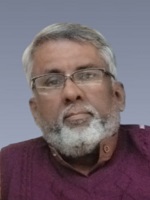
Mr. Ahsan Ansari
Every year on April 21, we commemorate the death anniversary of a personality who holds not only a prominent place in Urdu literature but also played a pivotal role in awakening a nation’s consciousness. That personality is Allama Iqbal — a great poet, philosopher, and national leader. His life and achievements continue to guide us today, reminding us of the importance of identity and selfhood.
Allama Iqbal was born on November 9, 1877, in Sialkot. His father’s name was Sheikh Noor Muhammad, a religious and pious man. Iqbal received his early education in his hometown and later joined Government College in Lahore for higher studies. He excelled in philosophy, literature, and history and then went on to pursue further education in England and Germany. His academic experiences greatly influenced his personality, and he beautifully expressed these experiences through his poetry.
Iqbal began his poetic journey in the Persian language with his first book Asrar-e-Khudi (Secrets of the Self), which was centered on the philosophy of Khudi (selfhood). In this work, he explored the highest form of human potential. His poetry prominently features themes such as selfhood, nationalism, and spiritual awakening. His most famous works include Bang-e-Dra, Shikwa, Jawab-e-Shikwa, and Armaghan-e-Hijaz.
A significant aspect of Iqbal’s poetry is his deep concern for the plight of Muslims, their culture, and their traditions. His work is infused with determination, courage, and a sense of struggle that continues to inspire people to this day. For example, his famous verse:
“Khudi ko kar buland itna ke har taqdeer se pehle,
Khuda bande se khud pooche, bata teri raza kya hai.”
(“Raise thyself to such heights that before every fate,
God Himself will ask thee: What is thy desire?”)
This verse highlights the importance of selfhood and urges individuals to recognize their inner strength and potential.
Iqbal’s philosophy delves deep into the essence of human existence. He introduced the concept of Khudi, which emphasizes that individuals must fully utilize their abilities. His ideas left a profound impact not only on poetry but also on Islamic thought. Iqbal showed Muslims a new path and encouraged them to protect their cultural and spiritual heritage.
Iqbal’s poetry offered a unique blend of Eastern culture, philosophy, and spirituality. His verses resonate with themes of love, devotion, and closeness to God. He constantly reminded Muslims of their history and traditions and sought to awaken their sense of selfhood. His philosophy was that a nation’s progress lies in self-awareness — and if nations forget their identity, they ultimately fail.
In 1930, at the session of the All-India Muslim League, Allama Iqbal demanded a separate homeland for Muslims. This vision laid the foundation of the Pakistan Movement, making him one of its ideological architects. Through his poetry, he repeatedly emphasized the rights, identity, and independence of Muslims.
Iqbal urged Muslims to think of themselves as a united nation. He made it clear that if Muslims recognized their inner strength and preserved their traditions, they could become a powerful force in the world. His famous verse:
“Khudi ko kar buland itna ke har taqdeer se pehle,
Khuda bande se khud pooche, bata teri raza kya hai.”
is a call for Muslims to become masters of their destiny and believe in their own strength.
Allama Iqbal passed away on April 21, 1938, but his poetry and philosophy live on. Even after his death, his works continue to guide new generations. Each year, on his death anniversary, various ceremonies are held where people recite his poetry, discuss his ideas, and learn from his life.
One of the unique qualities of Iqbal’s poetry is that it’s not just literary but also deeply philosophical. Through his poetry, he provided a new direction to humanity and emphasized the importance of identity. His work remains a guiding light for today’s youth, encouraging them to preserve their culture and values.
Iqbal’s death anniversary reminds us that he was a poet of profound thought, who elevated Urdu literature and guided Muslims toward a new path. His poetry and philosophy continue to inspire us and help us understand the significance of identity. On this day, we should pledge to adopt Iqbal’s ideas in our lives and work for the development of our nation.
Iqbal’s poetry, philosophy, and ideology are a treasure for us. We must remember that Iqbal’s message is not just that of a poet but of a leader — a leader who urged us to strive for the progress and prosperity of our nation. Today reminds us to uphold Iqbal’s legacy and dedicate ourselves to the betterment of our country.
